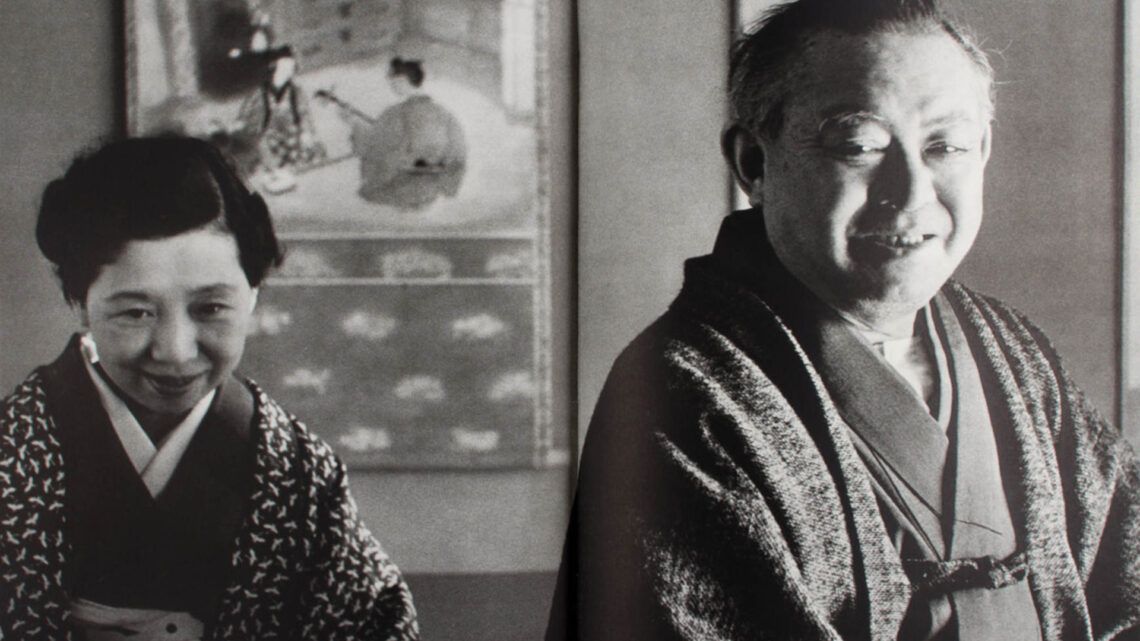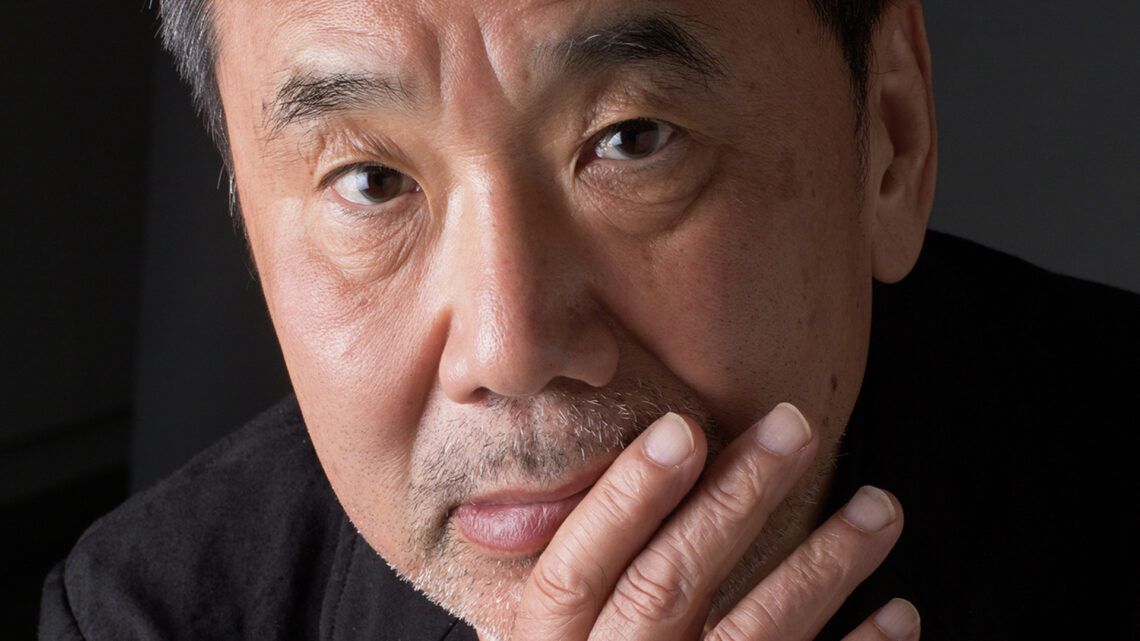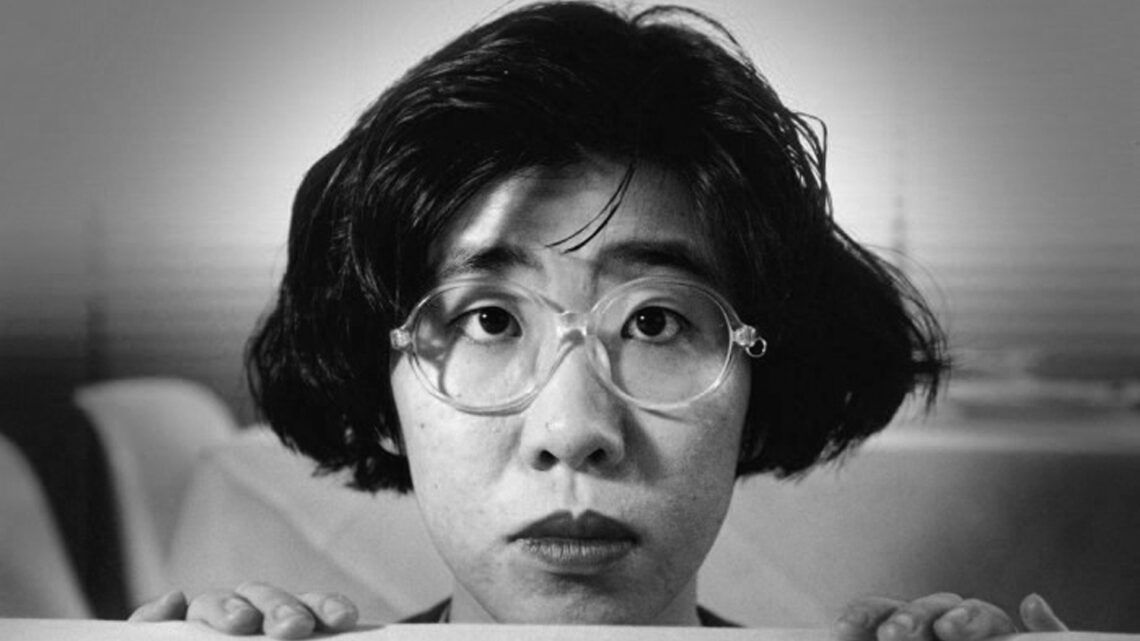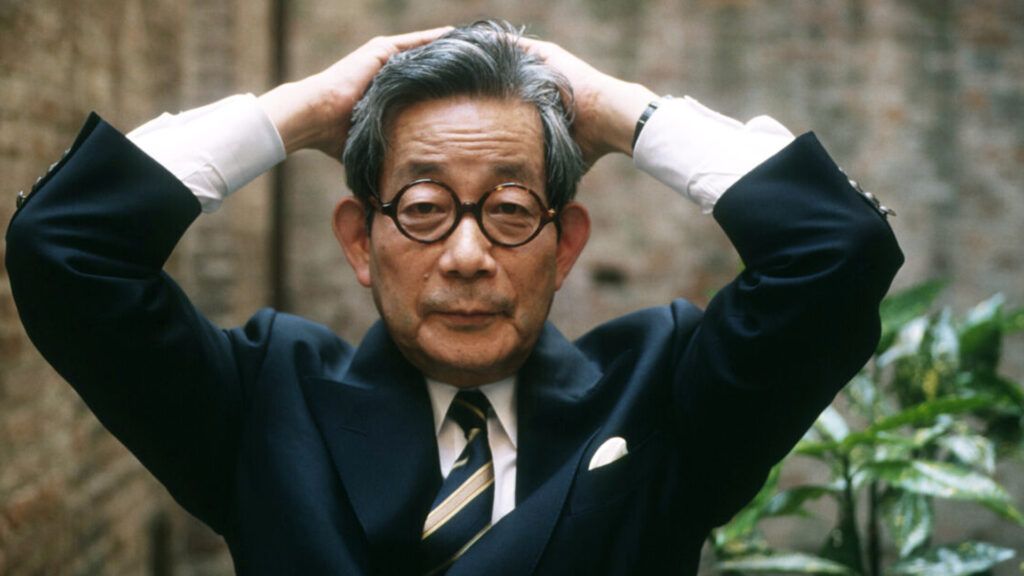
Kenzaburo Oe, born on January 31, 1935, in Ehime, Japan, is a significant writer of his generation and an outstanding representative of 20th-century Japanese literature. His oeuvre encompasses novels, essays, short stories, and literary criticism. Oe has received numerous awards and honors, including the Nobel Prize in Literature in 1994. His work is characterized by extraordinary depth and versatility, exploring themes such as Japanese history and culture, political and societal issues, as well as the human psyche and existence.
Kenzaburo Oe grew up in a small town on the island of Shikoku. Already in his youth, he developed a keen interest in literature and began writing his own texts. After studying at the University of Tokyo, he worked as a teacher, integrating his life experiences and observations into his writing. He made his literary debut in 1957 with the novel “Shizukari wa dokushi” (How Can We Translate Silence).
Oe’s work is marked by a deep commitment to Japanese society. He critically engages with the history and culture of his country and does not shy away from provocation. Especially in his early novels like “Kozoku narino” (A Troubled Life) from 1958, his struggles with political and social issues are reflected. He also addresses sensitive topics such as Japanese post-war society and Japan’s role in World War II.
In addition to his novels, Oe has also published a variety of essays and short stories, which also demonstrate his broad range of interests and profound insights into Japanese society. He is known for his clear and provocative writing style, which stimulates reflection and often sparks controversial discussions.
A particularly notable feature of Oe’s work is his exploration of the human psyche and existence. In novels like “Moékaido-tachi” (Moékaido Circles) from 1971 and “A Personal Matter” from 1964, he delves into the depths of the human soul and the search for identity and meaning in life. He does not hesitate to depict cruel and unsettling situations to emphasize the absurdity of human existence.
Throughout his career, Oe has received a variety of awards and honorary titles, underscoring his significant legacy in Japanese and international literature. In addition to the Nobel Prize in Literature in 1994, he has been awarded the Akutagawa Prize and the Tanizaki Jun’ichiro Prize. His influence on Japanese literature is undeniable, and his work will continue to inspire and touch generations of writers and readers in the future.
Kenzaburo Oe is not only an outstanding writer but also a committed intellectual who advocates for political and societal issues.
The Work of Kenzaburo Oe
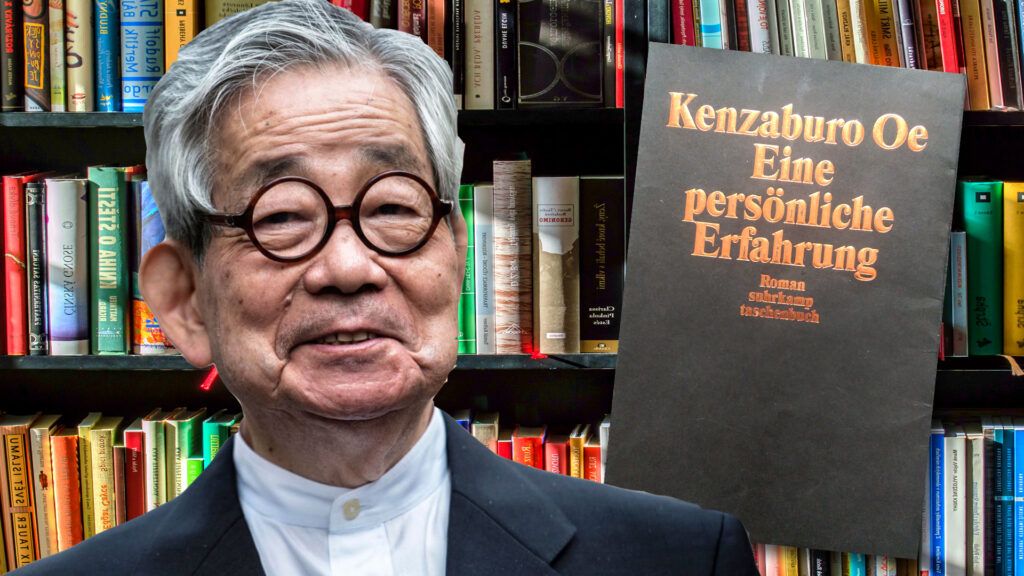
Kenzaburo Oe, one of Japan’s most significant contemporary writers, whose life and work were also shaped by the tumult of World War II and the subsequent American occupation. These formative experiences are reflected in his works, which often engage with Japan’s social, political, and cultural challenges. His novels and essays are characterized by deep moral reflection and a strong commitment to social justice.
Oe began his literary career in the 1950s and quickly became recognized as one of the leading voices in post-war Japanese literature. His debut novel, “A Personal Matter,” published in 1964, brought him international acclaim and won the prestigious Akutagawa Prize. In this novel, Oe explores the psychological effects of war on Japanese society through the story of a young father confronted with the birth of his disabled son.
Another outstanding work by Oe is the novel “The Silent Cry” from 1978. In this work, he examines the consequences of environmental pollution and the loss of traditional ways of life in rural communities in Japan. With compelling language and deep empathy for the suffering of his characters, Oe succeeds in raising awareness among readers about the pressing ecological issues of his time.
In addition to his novels, Oe is also known as an essayist and political commentator. In his essays, he regularly addresses current social and political issues, advocating for democracy, human rights, and peace. His clear and incisive language, along with his fearless commitment, has made him an important voice in public discourse in Japan.
Despite his international fame, Oe has always remained true to his roots, closely intertwining his work with Japanese culture and history. Drawing from a rich reservoir of literary and philosophical traditions, he weaves them together with his own visionary voice in a unique way. In doing so, he raises universal themes and questions that are relevant beyond the borders of Japan.
Kenzaburo Oe’s work is characterized by deep humanity and an unwavering hope for a better world. Despite the often dark and disturbing themes he explores, his literature radiates a certain hope and optimism. It is this blend of realism and idealism that makes his work so unique and timeless, securing him a firm place in the canon of world literature.
His unique ability to capture the complexity of human experience in all its facets makes Kenzaburo Oe one of the outstanding writers of his generation. His work will continue to fascinate and inspire readers around the world, while also shedding light on and discussing the pressing issues of our time.
Through his literary work, Kenzaburo Oe has bridged the gap between East and West, contributing to overcoming cultural barriers and fostering a deeper understanding and compassion among people. His legacy will extend far beyond his own time, inspiring generations of readers to seek commonalities and connections beyond the boundaries of nations and cultures.
Kenzaburo Oe is not just a writer but also a thinker and humanist whose influence transcends literature and manifests in his dedication to the values of humanity and tolerance. In a world marked by conflicts and divisions, his work reminds us that we are all part of the same humanity and that it is within our power to create a better and more just world.
His voice may fall silent, but his legacy will continue to live on, touching the hearts and minds of people long after his passing. Kenzaburo Oe has left an unforgettable mark on the history of literature with his life and work and will forever be remembered as one of Japan’s and the world’s greatest writers.
Kenzaburo Oe has created a variety of significant works throughout his career, which have made him one of Japan’s most esteemed writers. Some of his most notable works include:
“A Personal Matter” (1964): This novel tells the story of a young father confronted with the birth of his disabled son, grappling with questions of responsibility, guilt, and morality. The work was internationally celebrated and awarded the prestigious Akutagawa Prize.
“The Silent Cry” (1978): In this novel, Oe addresses the consequences of environmental pollution and the loss of traditional ways of life in rural communities in Japan. He vividly illustrates the effects of modernization on nature and people.
“The Day He Himself Shall Wipe My Tears Away” (1988): This novel follows a Japanese writer traveling to London to visit his imprisoned brother, confronting cultural differences and the historical entanglements between Japan and Great Britain. The work is an introspective exploration of identity, family, and the search for reconciliation.
“Death by Water” (2005): In this novel, Oe grapples with the trauma of the atomic bombings of Hiroshima and Nagasaki, as well as the Fukushima disaster. He explores the psychological and moral implications of these events on Japanese society, raising questions of guilt, memory, and forgiveness.
“The Persian Dances” (1989): This collection of short stories encompasses a variety of themes and motifs that shape Oe’s work, including the experience of war, the search for identity, and the relationship between humans and nature. The stories are marked by deep emotional intensity and a strong moral message.
These works are just a glimpse of Kenzaburo Oe’s extensive body of work, characterized by an impressive diversity of themes, styles, and narrative techniques. They demonstrate his ability to tackle complex societal and psychological issues, transforming them into compelling literary masterpieces that touch and inspire readers around the world.
My personal conclusion:
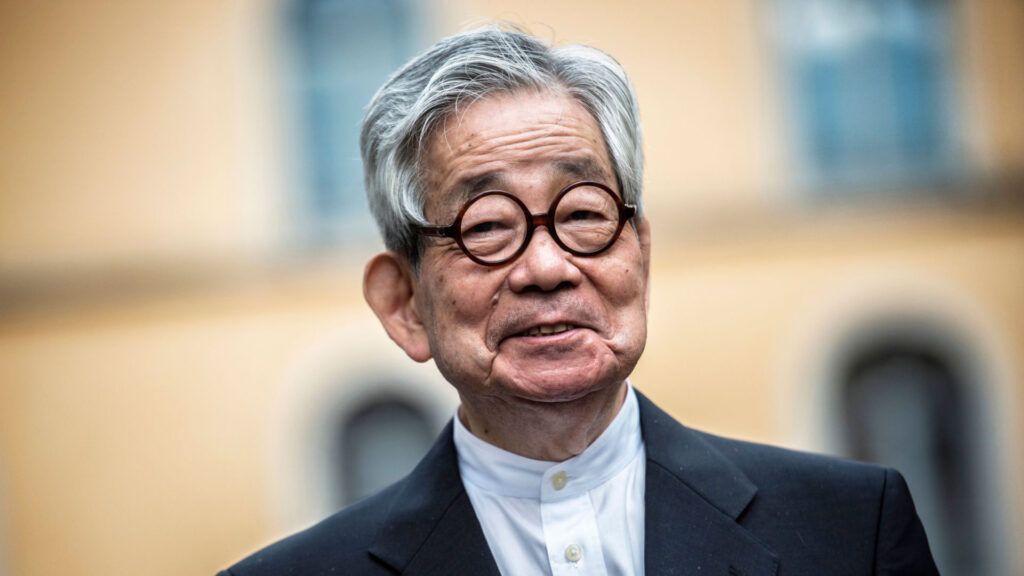
Kenzaburo Oe, one of Japan’s most significant writers, has had a profound impact on the world of literature with his work. His works are characterized by extraordinary sensitivity, deep intellectual penetration, and unparalleled literary mastery. In my personal conclusion on Kenzaburo Oe, I want to illuminate the various facets of his work and reflect on how they have influenced my understanding of literature and humanity.
One of the most impressive features of Oe’s work is his ability to explore complex human emotions and relationships. In novels like “A Personal Matter” and “The Day He Himself Shall Wipe My Tears Away,” he delves deep into the psyche of his characters, exposing their innermost thoughts and fears, thereby revealing the complexity of human experience. His protagonists often face existential crises and moral dilemmas that compel them to confront the deepest truths about themselves.
Furthermore, Oe’s ability to address societal and political issues in a subtle and nuanced manner impresses me. In works like “Death by Water” and “A Quiet Life,” he takes a critical look at Japanese society and the aftermath of World War II. He does not shy away from addressing controversial topics and breaking taboos, challenging his readers to contemplate the complex issues of their time.
Another aspect of Oe’s work that fascinates me is his experimental approach to the form and structure of the novel. In books like “The Silent Cry” and “The Silent Echo,” he employs unconventional narrative techniques and structures to explore the boundaries of literature and discover new possibilities of expression. His play with language and symbolism challenges readers to look beyond the surface of his stories and discover deeper layers of meaning.
But what impresses me most about Kenzaburo Oe is his unwavering moral integrity and his commitment to defending humanity. Both in his literary work and in his public activism, he advocates for the rights of the oppressed and fights against any form of injustice and discrimination. His advocacy for the victims of the Minamata mercury poisoning and his dedication to nuclear disarmament demonstrate his deep empathy for the suffering of his fellow human beings and his desire to create a better world.
Overall, Kenzaburo Oe’s work has not only expanded my understanding of literature but also sharpened my awareness of the ethical and moral challenges of our time. His books are more than just stories – they are lessons about life, human nature, and the power of art to change the world. Through his work, he has not only enriched Japanese literature but also left a lasting impact on the global literary landscape. It is my wish to honor his legacy by continuing to read his books and allowing myself to be inspired by his wisdom and empathy.
With every page I read of Kenzaburo Oe’s works, I discover new layers of meaning and experience a deeper connection to the themes he addresses. His ability to explore the human soul and capture the complexity of life in all its facets makes him a timeless writer whose work will continue to inspire generations of readers in the future. In his work, I find not only aesthetic pleasure but also intellectual nourishment and a source of insight into the world and myself.
In conclusion, my personal conclusion on Kenzaburo Oe is characterized by deep respect, admiration, and gratitude. His books have enriched my thinking, expanded my perspective, and touched my heart. They are not just literary masterpieces but also guiding lights on my own life journey. I am grateful for the opportunity to immerse myself in the world of Kenzaburo Oe and learn from his wisdom. May his legacy continue to live on forever and remind us time and time again that literature has the power to change us and the world for the better.
Hermann Candahashi

